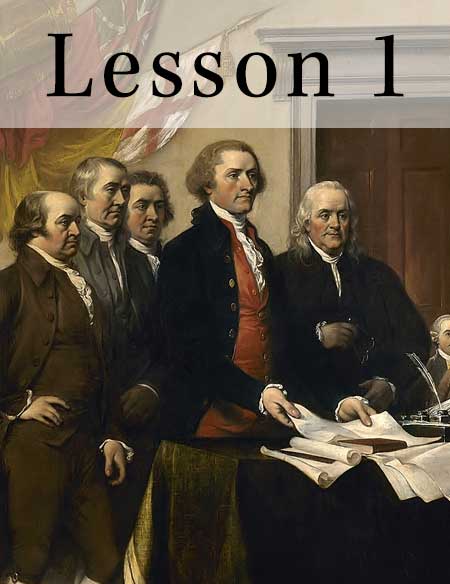Lesson 1: What were people like in the British colonies in America during the 1770s?
Adams, John (1735-1829) Adams was the second president of the United States. He was a lawyer, revolutionary leader, and leading Federalist. As a member of the Continental Congress, Adams served on the committee to draft the Declaration of Independence. He was minister to the Netherlands and Great Britain. Adams was elected vice president in 1789 and president in 1796.
Franklin, Benjamin (1706-1790) Franklin was the oldest delegate to the Philadelphia Convention. With the possible exception of George Washington, Franklin was the best-known man in America. Born into a poor family, Franklin became an inventor, scientist, diplomat, and publisher. His Poor Richard's Almanac was read nationwide. His career in public service was long and varied, and included service as ambassador to England and France and as governor of Pennsylvania. At the Philadelphia Convention, Franklin was a compromiser, using wit to bring delegates together. A staunch advocate of colonial rights, he helped draft the Declaration of Independence and the Treaty of Paris (1783). He played an important role in creating the Great Compromise. He favored a strong national government and argued that the Framers should trust the judgment of the people. Although he was in poor health in 1787, he missed few sessions, being carried to and from the meeting place in a special chair. Although he did not agree with everything in the Constitution, he believed that no other convention could come up with a better document.
Henry, Patrick (1736-1799) A prominent political leader and supporter of the Revolutionary cause, Henry opposed the Philadelphia Convention and refused to attend. Henry argued against the development of a strong national government. He was suspicious of what might happen at the convention and is reported to have said "I smell a rat." Henry led opposition in Virginia to ratification of the Constitution and later worked to include the Bill of Rights in the Constitution.
Washington, George (1732-1799) George Washington was born in Virginia in 1732. He grew up there on several plantations along the Potomac and Rappahannock Rivers. He was not particularly well educated, but did learn surveying. In 1753, he began his service to the country, which was to continue throughout his life, despite his desire to live a more private existence. Washington's efforts as commander of the Continental Army are well known. After the Treaty of Paris was signed in 1783, Washington returned to his home, Mount Vernon. Although he did not initially want to attend the Philadelphia Convention, his friends convinced him that his presence was necessary. He was elected president of the convention but spoke little. His presence and approval, however, were important. Nearly everyone assumed that Washington would be the first president of the United States, which, of course, he was, serving from 1789-1797.




